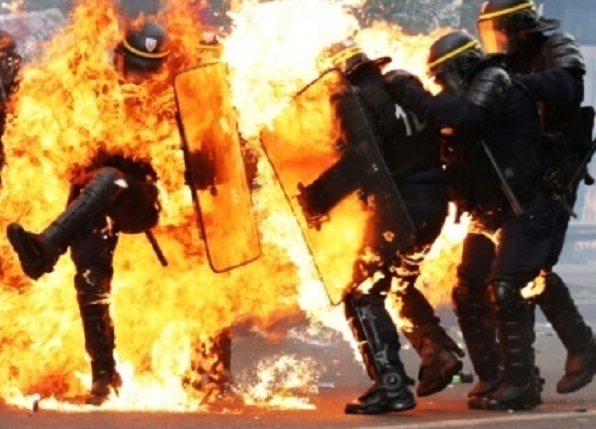May Day war and peace as one arrest in London but Paris protesters try to kill officers
May Day celebrations passed off relatively peacefully in the UK while officers in France were left battered and burned under sustained attacks from hundreds of protesters.
May Day celebrations passed off relatively peacefully in the UK while officers in France were left battered and burned under sustained attacks from hundreds of protesters. The Metropolitan Police Service (MPS) confirmed only one arrest despite central London being closed down to traffic as thousands attended the march from Clerkenwell Green to Trafalgar Square on Monday (May 1). The MPS said the appropriate policing plan for the event to mark International Workers Day in Britain passed almost without incident. There was one arrest in relation to a flare, said a MPS spokesperson, and no other disorder reported. The history of May Day in the UK, which has its roots in pagan Anglo-Saxon customs and was revived in 1660 following the restoration of Charles II to the throne, is littered with policing incidents. Anti-capitalist protests marred the 2000 event in London and there were 31 arrests the following year for offences including possession of drugs, possession of offensive weapons and public disorder when the capitals shopping heartland of Oxford Street and Regent Street became a focal point for running battles with police in acts of globalisation dissention. In 2003, with the backdrop of Iraq anti-war protests, the MPS was given special powers of arrest to contend with thousands of May Day marchers. Dozens of arrests were made through the day. Returning to the present, in Paris, French Interior Minister Matthias Fekl condemned the protesters as “professional vandals” who had come “to injure and kill police officers”. The annual May Day union march descended into violent clashes between officers and protesters as tensions ran high in France ahead of the vote to choose the countrys next president. Six officers were injured following clashes with around 150 people armed with sticks, stones and Molotov cocktails. One received third-degree burns to the hands and face after being engulfed in flames, while another suffered a hand injury from a stinger grenade. More than 9,000 armed officers and military were called in to manage the protests. Loud explosions, apparently from large firecrackers, were heard across Paris, while officers surrounded and used teargas on the 150-strong group, who threw firebombs and missiles. Police said around 142,000 people attended May Day marches across the country. Many used the celebration of workers` rights to protest against Marine Le Pen, the far-right presidential candidate who goes head-to-head with independent Emmanuel Macron in the final presidential vote on Sunday (May 7). Reacting to the scenes on Twitter, Ms Le Pen said: “This is the sort of mess … that I no longer want to see on our streets.” It is the first time in history that neither of the two main parties, the Socialists or the Republicans, will be in the final round of the election. It was 15 years ago on May Day, some 1.3 million people, including 400,000 in Paris, took to the streets of France in union-led demonstrations to protest against National Front founder Jean-Marie Le Pen father of Ms Le Pen who shocked the country by reaching the presidential run-off. Meanwhile in Turkey, police were forced to use tear gas and plastic bullets to disperse protesters seeking to defy a ban and march to Istanbul`s Taksim square to celebrate May Day 2017. Some 13 people were arrested during in Taksim, while a further 60 people were detained in the citys Besiktas district. More than 200 protesters in the Gayrettepe district on the European side of Istanbul attempted to walk to the famous square in spite of the ban by city authorities. The protesters - made up of left-wing groups unfurled anti-government banners against the result of the April 16 referendum, which handed President Recep Tayyip Erdogan expanded powers. Turkish authorities imposed a ban on any demonstration at Taksim square, with officers sealing off the avenue with barricades and halting traffic. Around 30,000 police officers were on duty in Istanbul alone, with the governor`


